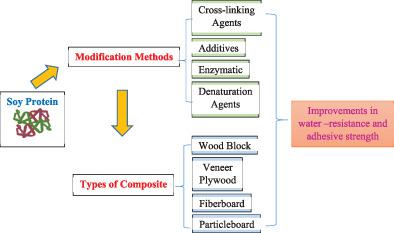当前位置:
X-MOL 学术
›
Polym. Eng. Sci.
›
论文详情
Our official English website, www.x-mol.net, welcomes your
feedback! (Note: you will need to create a separate account there.)
Improvements and limitation of soy protein-based adhesive: A review
Polymer Engineering and Science ( IF 3.2 ) Pub Date : 2021-08-25 , DOI: 10.1002/pen.25782 Sofie Zarina Lamaming 1 , Junidah Lamaming 2 , Nurul Fazita Mohammad Rawi 1 , Rokiah Hashim 1 , Mohamad Haafiz Mohamad Kassim 1 , Mohd Hazwan Hussin 3 , Yazmin Bustami 4 , Othman Sulaiman 1 , Mohd Hazim Mohamad Amini 5 , Salim Hiziroglu 6
Polymer Engineering and Science ( IF 3.2 ) Pub Date : 2021-08-25 , DOI: 10.1002/pen.25782 Sofie Zarina Lamaming 1 , Junidah Lamaming 2 , Nurul Fazita Mohammad Rawi 1 , Rokiah Hashim 1 , Mohamad Haafiz Mohamad Kassim 1 , Mohd Hazwan Hussin 3 , Yazmin Bustami 4 , Othman Sulaiman 1 , Mohd Hazim Mohamad Amini 5 , Salim Hiziroglu 6
Affiliation

|
Soy protein is known for its eco-friendly, sustainable, and biodegradable qualities that are likely used as raw material in producing bioadhesive. However, soy protein-based adhesive are lacking in terms of adhesive strength and water-resistance compared to commercial formaldehyde-based adhesives such as phenol and urea-formaldehyde resin. Therefore, continuous research has been done to improve adhesive performance. This can be done via physical or modification methods, including the usage of cross-linking agents, structural modification, enzymatic modification, and the addition of additives. This review will cover these modification methods that give significant enhancement to the water-resistance and adhesive strength of soy protein-based adhesives.
中文翻译:

大豆蛋白粘合剂的改进与局限:综述
大豆蛋白以其环保、可持续和可生物降解的特性而闻名,这些特性很可能用作生产生物粘合剂的原材料。然而,大豆蛋白基粘合剂与苯酚和脲醛树脂等商用甲醛基粘合剂相比,在粘合强度和耐水性方面存在不足。因此,已经进行了持续的研究以改进粘合性能。这可以通过物理或修饰方法完成,包括使用交联剂、结构修饰、酶促修饰和添加添加剂。本综述将介绍这些改性方法,这些方法显着提高了大豆蛋白基粘合剂的防水性和粘合强度。
更新日期:2021-10-01
中文翻译:

大豆蛋白粘合剂的改进与局限:综述
大豆蛋白以其环保、可持续和可生物降解的特性而闻名,这些特性很可能用作生产生物粘合剂的原材料。然而,大豆蛋白基粘合剂与苯酚和脲醛树脂等商用甲醛基粘合剂相比,在粘合强度和耐水性方面存在不足。因此,已经进行了持续的研究以改进粘合性能。这可以通过物理或修饰方法完成,包括使用交联剂、结构修饰、酶促修饰和添加添加剂。本综述将介绍这些改性方法,这些方法显着提高了大豆蛋白基粘合剂的防水性和粘合强度。











































 京公网安备 11010802027423号
京公网安备 11010802027423号